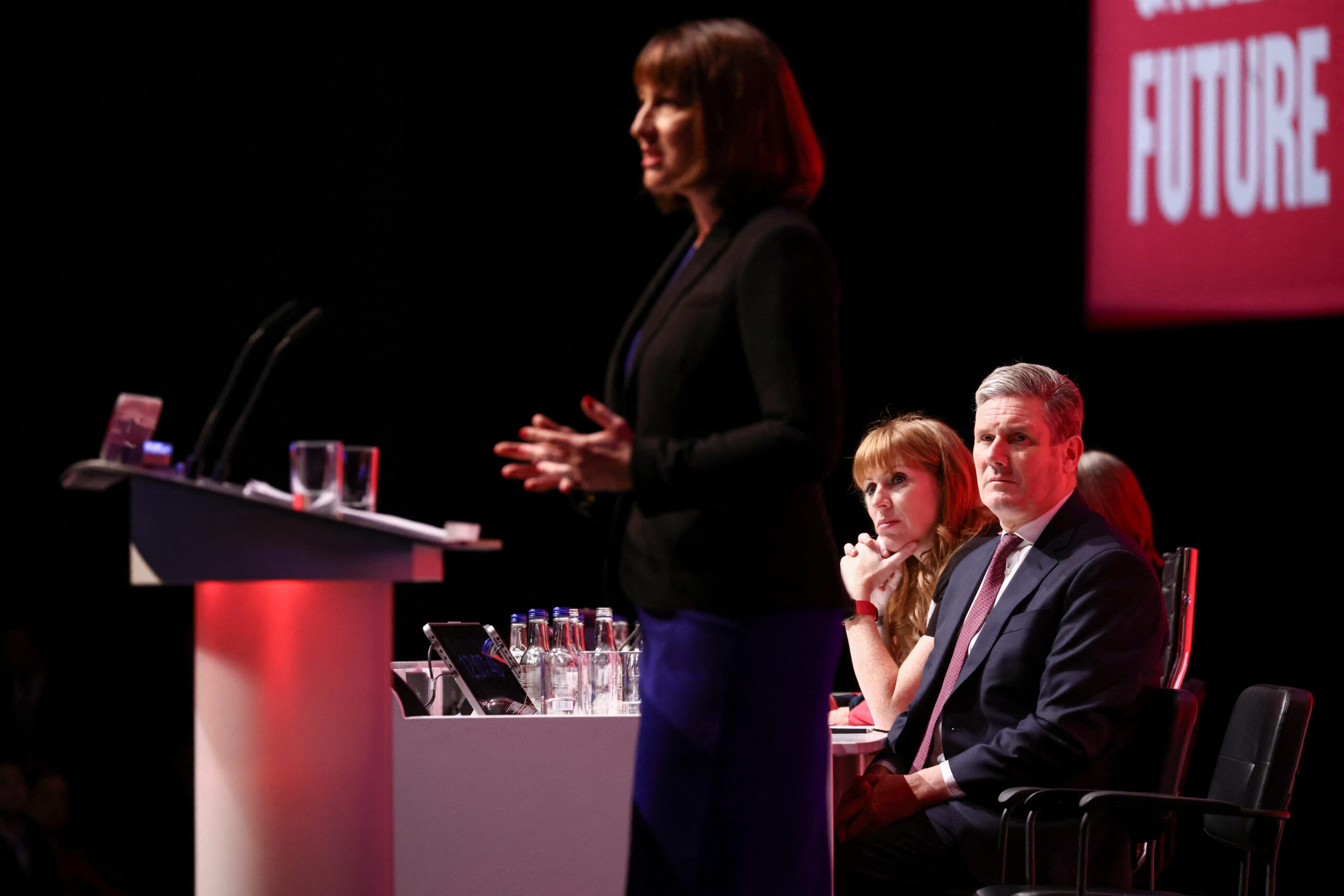Rachel Reeves Speech: Labour is Rehashing Corbynite Policies Without Explaining How It Would Pay for Them
If Labour wants a ‘fairer society’, it must say now which taxes it will impose on the richest.
by James Meadway
26 September 2022

Shadow chancellor Rachel Reeves’s conference speech contained a flurry of pledges on the economy that should be welcomed, but lurking behind her words are serious dangers for the party and the left in general.
Commitments to full decarbonisation of the electricity system by 2030, to renationalising the railways, and to establishing a national wealth fund to take publicly-owned shares in its new investments are all welcome rehashes of older Corbynite proposals. That commentators like the BBC’s Jo Coburn immediately declared the speech to be the “centre-ground”, or that Sebastian Payne from the Financial Times thought it to be the “opposite” of Corbynism shows just how effective our movement was in dragging that centre-ground to the left. And set against a government seemingly committed to shovelling billions towards the super-rich, regardless of economic consequences, the distance between the two parties is stark.
But while there is much to welcome, there are also two dangers here. The first will be familiar to anyone who follows Labour politics. Tony Blair’s Labour committed to renationalising the railways before he was in government. The pledge was in the 1997 manifesto, on which the party won its landslide. The nationalisation never happened. And many activists will point at Keir Starmer’s own record – openly junking commitments he made during his leadership election. It’s pressure from the movements – whether Enough is Enough, Don’t Pay, or the still-rising tide of industrial struggles – that will apply the pressure needed to bolt the party to its current policy pledges.
The second danger is less familiar, and has become only too apparent in the few days since chancellor Kwasi Kwarteng’s extraordinary “fiscal event” on Friday. By slashing taxes for the rich and so running up huge government deficits, Kwarteng has sparked an almighty sell-off by traders and speculators of pounds and government bonds, sending the currency plummeting and forcing up the price of government borrowing. Traders are essentially betting against the government being able to stick to its commitments on these tax cuts and future spending.
But, assuming the Conservatives can ride the crisis out and borrow on the scale they are proposing, the increase in Britain’s government debt is creating a major problem for any future government. The room to add more to this debt pile without sparking off another crisis is shrinking. Britain is a weak, over-indebted economy with a heavy dependence on imports for essential goods like natural gas and food. The scope for future governments to act is therefore heavily constrained. It will not be possible in the future for them to borrow so cheaply and so much. Trying to borrow on a large scale would likely spark another financial market bloodbath like we have seen in the last few days. Britain is a declining power in the world and the currency crisis is a direct reflection of that.
This danger was a primary reason why Labour under Jeremy Corbyn adopted a very clear rule for its future spending and borrowing – the fiscal credibility rule. The intention was to close down any possible financial market panic were Jeremy Corbyn to be elected prime minister – which of course was a distinct possibility in 2017. (John McDonnell, for the same reason, committed to the independence of the Bank of England.) Likewise, fully costing the manifesto wasn’t just an electoral appeal – by laying out as precisely as possible how much a government will tax and spend, the scope for financial markets to react badly to our spending plans was (we hoped) therefore reduced. Sometimes people criticised these rules for being some sort of electoral ploy. They were not. They were the carapace a left government in a weak economy needs against the firestorms that financial markets can launch. With that shell fixed in place, the new government could get on with the serious business of reform.
Reeves has rightly adopted the same broad position, setting out a plan to only borrow for investment spending and pledging to offer a fully-costed manifesto. She has pledged that she will not return to austerity. This combination – fully-costed manifestos, clear rules for government borrowing, and opposition to austerity – is close to a photocopy of McDonnell’s fiscal and monetary framework as shadow chancellor. But where McDonnell laid out very clearly how he was going to fund increased spending, detailing each tax rise in both the elections fought, and was prepared very early on to say how much borrowing he expected to do, Labour under Reeves has been much quieter. She got a cheer in the hall for promising to restore the 45p “additional rate” that Kwarteng just cut. She has previously hinted at taxes on various forms of wealth. But she and her team have been much less willing to stake out what taxes they expect to introduce – or how they will compensate for the huge losses to government tax revenues from Kwarteng’s tax cuts.
This is a serious danger. This is where the pressure to revert to austerity spending cuts may start to appear – or, at the very least, to scale back on the ambition needed to turn this unproductive, unsustainable, unequal economy around. Reeves has been stacking up the spending commitments. She has already pledged £28bn a year of green investment, to be funded by borrowing. The last few days have exposed as obvious nonsense the idea that the British government can either borrow or print money to pay for its spending indefinitely. If the party wants a “fairer society”, Labour needs to say now which taxes on the richest it will impose.
James Meadway is an economist.


